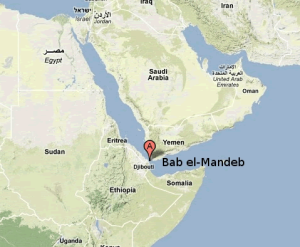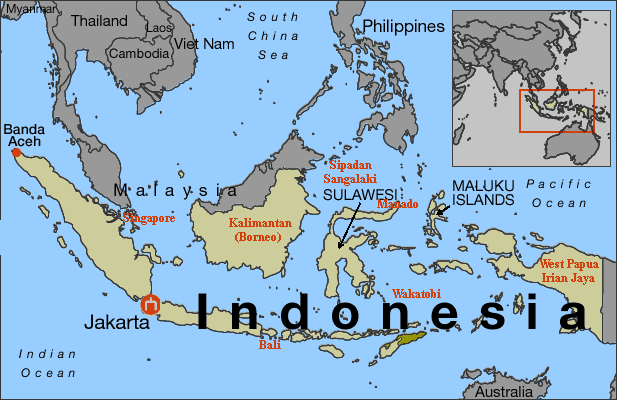Sunil Prasannan
Bab-el-Mandeb
 Bab-el-Mandeb, which means gate of tears, is the name given to the strait at the southern end of the Red Sea and has been identified as one of the two routes taken by humans ‘out of Africa’ around 120,000 years ago, the other being through Sinai.
Bab-el-Mandeb, which means gate of tears, is the name given to the strait at the southern end of the Red Sea and has been identified as one of the two routes taken by humans ‘out of Africa’ around 120,000 years ago, the other being through Sinai.
The Strait has also been identified by some researchers as the location of the Pillars of Heracles referred to by Plato. This idea is advocated by Jacques Hébert, Thérêse Ghembaza and Sunil Prasannan who have respectively located Atlantis at Socotra, Meroë and Sundaland.
The French historian Philippe Potel-Belner also identifies Bab-el-Mandeb as the Pillars of Heracles(c) beyond which lay Atlantis on a long plain on the west coast of India(b).
>Atlantisforschung has also pointed out that Radek Brychta was another one to nominate Bab-el-Mandeb as the site of the ‘Pillars’(d).<
A fictional account of the destruction of Atlantis in the Red Sea and its relationship with the biblical Deluge by Orson Scott Card is now available on the Internet(a).
(a) http://www.hatrack.com/osc/stories/atlantis.shtml
(b) https://www.academia.edu/3480936/Atlantis_myth_legend_History (French) (offline Nov. 2015)
(c) https://www.academia.edu/3339364/PLATO_revisited_what_he_precisely_said_about_Atlantis (French) (offline Nov.2015)
(d) Säulen des Herakles – Atlantisforschung.de (atlantisforschung-de.translate.goog) *
Indonesia
Indonesia in recent years has seen an increasing number of supporters for the idea of Atlantis being located in the vicinity of today’s archipelago, prior to the ending of the last Ice Age, on the submerged continental shelf now frequently referred to as Sundaland. The redating of cave paintings on the island of Sulawesi suggests that they are as old as any in Europe(h), possibly stretching back as far as 40,000 years. A 2016 report(j) has now pushed back the earliest human occupation on Sulawesi to 100,000 years ago.
 As far as I can ascertain the earliest suggested linkage between Atlantis and Indonesia came from the leading Theosophist, C. W.Leadbeater (1854-1934). In a booklet, The Occult History of Java[1094], published in 1951 he proposed that Java had been an Atlantean colony.
As far as I can ascertain the earliest suggested linkage between Atlantis and Indonesia came from the leading Theosophist, C. W.Leadbeater (1854-1934). In a booklet, The Occult History of Java[1094], published in 1951 he proposed that Java had been an Atlantean colony.
However, it is reported(g) that Sukarno (1901-1970), the first president of Indonesia, spoke of Atlantis nearly half a century ago when he located it in the Atlantic
William Lauritzen was probably the first to advocate this idea of a Sundaland connection on his website, but it seems that the concept was given a huge boost by the publication of the late professor Arysio Nunes dos Santos’ book Atlantis: The Lost Continent Finally Found[320].
The idea was given a boost in February 2012 when it was reported(a) by a somewhat incredulous Jakarta Post that the Indonesian president had given his support to a search for an ancient sunken civilisation in Indonesian waters following meetings with researchers including British author Stephen Oppenheimer.
May 2013 saw The Jakarta Post report(b) the publication of a book by local geologist, Danny Hilman Natawidjaja in which he claims that Atlantis was part of prehistoric Indonesia. In the book, entitled Penemuan Atlantis Nusantara (The Discovery of Atlantis in the Archipelago) he claims to base his theory on Plato’s text. However, commenting on the book the Indonesian archaeologist Daud Aris Tanudirjo said that Natawidjaja’s claim was ‘premature’, pointing out that the author had only an English translation of Plato’s text to work with and suggesting that Natawidjaja had no knowledge of ancient Greek. Further background information was subsequently made available(c).
Natawidjaja also claims that a site at Gunung Padang, 120 km southwest of Jakarta may be more than 9,000 years old! Graham Hancock has expanded on this idea(e). Nevertheless, a recent assault on Natawidjaja’s theories in an open letter(m) from Rebecca Bradley, has laid bare the weaknesses in his contentions.
In 2015 Dahni Irwanto published Atlantis: The lost city is in Java Sea[1093], in which he located the biblical Garden of Eden and the legendary island of Taprobane on the Indonesian island of Kalimantan (Borneo) and placed Atlantis off its coast. Irwanto has built on the work of Santos, expanding Santos’ 32-checklist to 60 headings. In his well-illustrated book, Irwanto goes further with the suggestion that Atlantean Indonesia was a cultural centre from which post-diluvian refugees spread throughout the world influencing the great civilisations of Asia, the Mediterranean and the Americas.(p.143) He subsequently published Sundaland: Tracing the Cradle of Civilization (1618) in which he develops his idea that ancient Indonesia was a hyperdiffusionist hub. Although I found this book interesting, I thought it was over speculative.
Coincidentally, Delisle de Sales, writing in the 18th century cited an anonymous source who placed Atlantis in Taprobane, considered at the time to be a reference to Ceylon (now Sri Lanka), not Irwanto’s Indonesian Kalimantan.
A short April 2016 blog(k) suggests that Quranic Archaeology may be used to support the idea of an Indonesian Atlantis, a sentiment expressed again a month later(l).
The ‘Atlantis in Indonesia’ bandwagon became more crowded in 2019 when an entire group climbed aboard. They are known as Turangga Seta, whose founder and spokesman Timmy Hardati claims that Atlantis was submerged in the Java Sea. They also claim that there is a 300-metre-high pyramid inside Bandung’s Mount Lalakon! However, the twist in the tale is that the group has no interest in conventional science preferring to depend on psychic ‘conversations with ancestors’.(o) While Irwanto’s theories may be hard to accept, at least he presents them in a rational coherent manner, the same cannot be said of the Turangga Seta(n).
Also See: Zia Abbas, Sunil Prasannan and Panji R. Hadinoto
(a) See: Archive 3629
(b) https://www.thejakartapost.com/news/2013/05/28/ri-was-home-atlantis-says-geologist.html
(e) https://www.sott.net/article/271881-Gunung-Padang-The-lost-records-of-Atlantis
(f) https://theosophists.org/library/books/occult-history-of-java/
(i) https://atlantisjavasea.com/tag/plato/
(j) https://www.uow.edu.au/media/2016/earliest-human-occupation-of-sulawesi-pushed-back-dramatically.php *
(k) https://www.islamsejati.com/2016/03/ahli-arkeologi-fakta-dari-al-quran.html (offline Jan. 2017)
(m) https://www.skepticink.com/lateraltruth/2017/05/14/gunung-padang-open-letter-danny/
(o) https://www.vice.com/en/article/zmpne3/atlantis-location-java-sea-indonesia-proof
Abbas, Zia *
Zia Abbas, according to his own blurb, is a computer scientist and works as a freelance software engineer and consultant for many companies. He is the author of Atlantis: The Final Solution[001] in which he claims to prove that Plato’s Atlantis is to be found in the South China Sea. The core proposal of this book is that Atlantis was located on the continental shelf in the South China Sea,  known as Sundaland, which was exposed before the end of the last Ice Age, when it was inundated as the glaciers retreated. According to Abbas, this large landmass contained the original Atlantis and was known as Idress. It is quite probable that early urban settlements did exist along the coast and at the river mouths of Sundaland, and were subsequently flooded. However, it is quite improbable that the flooding of these towns and villages were the inspiration for the Atlantis of Plato. Remember that at the same time, similar inundations were taking place much closer to home in the Mediterranean and the Atlantic and these events are more likely to have been remembered in the legends and myths familiar to Plato. The prehistoric flooding of the Sundaland region is covered extensively in Stephen Oppenheimer’s Eden in the East [004].
known as Sundaland, which was exposed before the end of the last Ice Age, when it was inundated as the glaciers retreated. According to Abbas, this large landmass contained the original Atlantis and was known as Idress. It is quite probable that early urban settlements did exist along the coast and at the river mouths of Sundaland, and were subsequently flooded. However, it is quite improbable that the flooding of these towns and villages were the inspiration for the Atlantis of Plato. Remember that at the same time, similar inundations were taking place much closer to home in the Mediterranean and the Atlantic and these events are more likely to have been remembered in the legends and myths familiar to Plato. The prehistoric flooding of the Sundaland region is covered extensively in Stephen Oppenheimer’s Eden in the East [004].
Abas was no trailblazer, as the idea of Atlantis in this region has been advocated since 1997 by investigators such as the late Professor Arysio Nunes dos Santos(a) and William Lauritzen(b). Abbas’ claims are just a poor rehash of their ideas and his particular book has done little to advance their acceptance. Around the same time, Dr. Sunil Prasannan published a paper on Graham Hancock‘s website that also endorsed the Atlantis in Sundaland theory(e). Since then, Dhani Irwanto has developed the Sundaland theory further, expanding Santos’ 32-point checklist to 60 points(d).
On the first page, Abbas claims that Atlantis was a republic, which seems rather strange for a confederation ruled by ten kings. He states that Athena was a ‘god’ of Atlantis, a claim that would have surprised Plato. Abbas also asserts that Atlantis is to be found in the Old Testament under the name of Enoch!
Further incongruity is encountered when we find that Abbas’ website includes a technical paper on Gravitation and Special Relativity.
This book is high on speculation and low on science. For many, the author’s credibility will completely vanish as soon as they encounter references to reptilian aliens a la David Icke, artificial structures on Mars or a hollow Earth. This is all a far cry from the Dialogues of Plato and probably explains the poor reviews that the book has received.
In a short paper entitled Atlantis in a Nutshell(c), Abbas offers a brief overview of Atlantis as he sees it.
Little has been heard from Abbas in recent years, during which the Atlantis in Sundaland theory has been advocated more convincingly by dos Santos and Irwanto.
(b) Welcome to Earth360.com (archive.org)
(c) Archive 2316 | (atlantipedia.ie) *
(d) Atlantis City in The Java Sea | Atlantis in the Java Sea (atlantisjavasea.com)
(e) Where was Atlantis? Sundaland fits the bill, surely! – Graham Hancock Official Website
